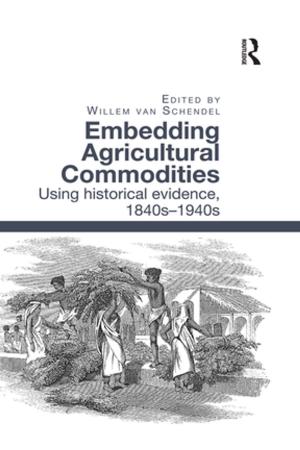Opposition and Legitimacy in the Ottoman Empire
Conspiracies and Political Cultures
Nonfiction, History, Modern, 19th Century, Middle East, Social & Cultural Studies, Social Science| Author: | Florian Riedler | ISBN: | 9781136852510 |
| Publisher: | Taylor and Francis | Publication: | December 21, 2010 |
| Imprint: | Routledge | Language: | English |
| Author: | Florian Riedler |
| ISBN: | 9781136852510 |
| Publisher: | Taylor and Francis |
| Publication: | December 21, 2010 |
| Imprint: | Routledge |
| Language: | English |
This book looks at opposition to the Ottoman government in the second half of the nineteenth century, examining a number of key political conspiracies and how these relate to an existing political culture. In his detailed analysis of these conspiracies, the author offers a new perspective on an important and well researched period of Ottoman history.
A close reading of police records on five conspiracies offers the opportunity to analyse this opposition in great detail, giving special attention to the different groups of political actors in these conspiracies that often did not come from the established political elites. Florian Riedler investigates how their background of class and education, but also their individual life experiences influenced their aims and strategies, their political styles as well as their ways of thinking on political legitimacy. In contrast, the reaction of the authorities to these conspiracies reveals the official understanding of Ottoman legitimacy.
The picture that emerges of the political culture of opposition during the second half of the nineteenth century offers a unique contribution to our understanding of the great changes in the political system of the Ottoman Empire at the time. As such, it will be of great interest to scholars of Middle Eastern history, political history, and the Ottoman Empire.
This book looks at opposition to the Ottoman government in the second half of the nineteenth century, examining a number of key political conspiracies and how these relate to an existing political culture. In his detailed analysis of these conspiracies, the author offers a new perspective on an important and well researched period of Ottoman history.
A close reading of police records on five conspiracies offers the opportunity to analyse this opposition in great detail, giving special attention to the different groups of political actors in these conspiracies that often did not come from the established political elites. Florian Riedler investigates how their background of class and education, but also their individual life experiences influenced their aims and strategies, their political styles as well as their ways of thinking on political legitimacy. In contrast, the reaction of the authorities to these conspiracies reveals the official understanding of Ottoman legitimacy.
The picture that emerges of the political culture of opposition during the second half of the nineteenth century offers a unique contribution to our understanding of the great changes in the political system of the Ottoman Empire at the time. As such, it will be of great interest to scholars of Middle Eastern history, political history, and the Ottoman Empire.















